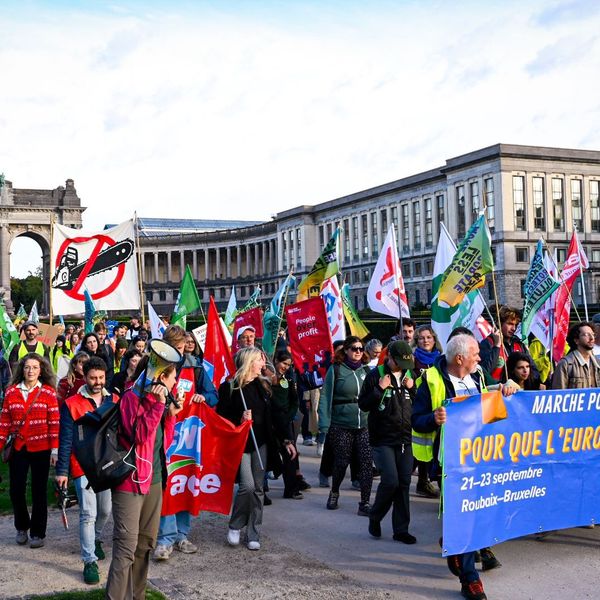As Support Plummets, Is EU Moving Closer to Becoming 'TTIP Free Zone'?
The next round of negotiations over the corporate-friendly trade deal will start in New York next week
Intercontinental opposition to the TransAtlantic Trade and Investment Partnership (TTIP) continues to grow, with a new poll out Thursday showing that support for the controversial deal has "plummeted" in Germany and the U.S. over the last two years.
The survey (pdf), conducted by YouGov for Germany's Bertelsmann Foundation, showed that only 17 percent of Germans believe the corporate-friendly trade agreement is a good thing, down from 55 percent in 2014. Likewise, in the United States, only 18 percent support the deal, compared to 53 percent two years ago--though nearly half of U.S. respondents said they did not know enough about the agreement to voice an opinion.
According to Ars Technica, "[t]here are three main areas driving public concern in Germany: fears about consumer protection, where 48 percent of those interviewed thought TTIP would have a negative effect; environmental standards (46 percent); and social standards--things like workers' rights--where 40 percent expressed concern. By contrast, those asked in the U.S. did not have worries about any particular issue."
The UK Independent noted that the survey findings are "bound to cast a shadow over TTIP talks between German Chancellor Angela Merkel and U.S. President Barack Obama in the next few days."
The agreement between the EU and the U.S., which would impact 800 million people, is at the top of the agenda for when Merkel and Obama meet, along with their respective trade ministers, at a German trade show on Sunday.
Politico said that meeting "is being billed as the 'last chance' to wrap up the deal before the White House changes hands." Trade ministers will gather in New York the following day to continue negotiations.
Beyond the Bertelsmann poll, "there have been abundant signs in recent weeks that European countries are growing impatient with the slow pace of the talks, which are due to resume in New York next week," Reuters reports:
On Wednesday, German Economy Minister Sigmar Gabriel described the negotiations as "frozen up" and questioned whether Washington really wanted a deal.
The day before, France's trade minister threatened to halt the talks, citing a lack of progress.
Deep public skepticism in Germany, Europe's largest economy, has clouded the negotiations from the start.
At a meeting in Barcelona on Thursday, under the banner "TTIP Free Zone," elected officials from 40 cities and towns across the EU stated their shared opposition to the trade deal.
\u201cCouncillors & mayors from 40 cities and towns across the EU agree to stand against #Ttip and #CETA #TTIPFreeZone\u201d— Global Justice Now (@Global Justice Now) 1461249848
\u201cTTIP-free regions and municipalities / \u03a0\u03b5\u03c1\u03b9\u03c6\u03ad\u03c1\u03b5\u03b9\u03b5\u03c2 \u03ba\u03b1\u03b9 \u0394\u03ae\u03bc\u03bf\u03b9 \u03ba\u03b1\u03c4\u03ac \u03c4\u03bf\u03c5 TTIP https://t.co/LJYDTlem5G #NoTTIP\u201d— Yiorgos Vassalos (@Yiorgos Vassalos) 1457342744
And 130,000 people have signed a petition demanding Obama "stop negotiations" on the TTIP in advance of his upcoming visit to the UK.
"The fact that Obama is being brought in to try and curry favor for this controversial trade deal is testament to the enormous tide of public opinion standing in the way of TTIP," said Global Justice Now director Nick Dearden on Tuesday.
"Millions of people across Europe have signed petitions against TTIP and hundreds of thousands of people have taken to the streets to oppose it," he said. "Not even Obama's famous charisma is going to persuade people in Europe to sign away important legislations protecting public services, labor rights, consumer standards, and public services."
The European Commission has attempted to quell some of the public opposition by developing a supposed "alternative" to the controversial Investor-State Dispute Settlement (ISDS) legal system written into trade deals like the TTIP.
But its proposed "Investment Court System" is merely a "PR rebranding exercise," according to a report (pdf) released Wednesday by Friends of the Earth Europe, Transnational Institute, Corporate Europe Observatory, the Forum Umwelt und Entwicklung, and the Canadian Center for Policy Alternatives.
"The 'Investment Court System' is nothing but smoke and mirrors," said Natacha Cingotti, trade campaigner at Friends of the Earth Europe. "It further enshrines VIP rights for corporations and will expand the clout of private arbitration and its profiteers. Far from limiting attacks against public interest regulations, it will pave the way for many more."
An Urgent Message From Our Co-Founder
Dear Common Dreams reader, The U.S. is on a fast track to authoritarianism like nothing I've ever seen. Meanwhile, corporate news outlets are utterly capitulating to Trump, twisting their coverage to avoid drawing his ire while lining up to stuff cash in his pockets. That's why I believe that Common Dreams is doing the best and most consequential reporting that we've ever done. Our small but mighty team is a progressive reporting powerhouse, covering the news every day that the corporate media never will. Our mission has always been simple: To inform. To inspire. And to ignite change for the common good. Now here's the key piece that I want all our readers to understand: None of this would be possible without your financial support. That's not just some fundraising cliche. It's the absolute and literal truth. We don't accept corporate advertising and never will. We don't have a paywall because we don't think people should be blocked from critical news based on their ability to pay. Everything we do is funded by the donations of readers like you. Will you donate now to help power the nonprofit, independent reporting of Common Dreams? Thank you for being a vital member of our community. Together, we can keep independent journalism alive when it’s needed most. - Craig Brown, Co-founder |
Intercontinental opposition to the TransAtlantic Trade and Investment Partnership (TTIP) continues to grow, with a new poll out Thursday showing that support for the controversial deal has "plummeted" in Germany and the U.S. over the last two years.
The survey (pdf), conducted by YouGov for Germany's Bertelsmann Foundation, showed that only 17 percent of Germans believe the corporate-friendly trade agreement is a good thing, down from 55 percent in 2014. Likewise, in the United States, only 18 percent support the deal, compared to 53 percent two years ago--though nearly half of U.S. respondents said they did not know enough about the agreement to voice an opinion.
According to Ars Technica, "[t]here are three main areas driving public concern in Germany: fears about consumer protection, where 48 percent of those interviewed thought TTIP would have a negative effect; environmental standards (46 percent); and social standards--things like workers' rights--where 40 percent expressed concern. By contrast, those asked in the U.S. did not have worries about any particular issue."
The UK Independent noted that the survey findings are "bound to cast a shadow over TTIP talks between German Chancellor Angela Merkel and U.S. President Barack Obama in the next few days."
The agreement between the EU and the U.S., which would impact 800 million people, is at the top of the agenda for when Merkel and Obama meet, along with their respective trade ministers, at a German trade show on Sunday.
Politico said that meeting "is being billed as the 'last chance' to wrap up the deal before the White House changes hands." Trade ministers will gather in New York the following day to continue negotiations.
Beyond the Bertelsmann poll, "there have been abundant signs in recent weeks that European countries are growing impatient with the slow pace of the talks, which are due to resume in New York next week," Reuters reports:
On Wednesday, German Economy Minister Sigmar Gabriel described the negotiations as "frozen up" and questioned whether Washington really wanted a deal.
The day before, France's trade minister threatened to halt the talks, citing a lack of progress.
Deep public skepticism in Germany, Europe's largest economy, has clouded the negotiations from the start.
At a meeting in Barcelona on Thursday, under the banner "TTIP Free Zone," elected officials from 40 cities and towns across the EU stated their shared opposition to the trade deal.
\u201cCouncillors & mayors from 40 cities and towns across the EU agree to stand against #Ttip and #CETA #TTIPFreeZone\u201d— Global Justice Now (@Global Justice Now) 1461249848
\u201cTTIP-free regions and municipalities / \u03a0\u03b5\u03c1\u03b9\u03c6\u03ad\u03c1\u03b5\u03b9\u03b5\u03c2 \u03ba\u03b1\u03b9 \u0394\u03ae\u03bc\u03bf\u03b9 \u03ba\u03b1\u03c4\u03ac \u03c4\u03bf\u03c5 TTIP https://t.co/LJYDTlem5G #NoTTIP\u201d— Yiorgos Vassalos (@Yiorgos Vassalos) 1457342744
And 130,000 people have signed a petition demanding Obama "stop negotiations" on the TTIP in advance of his upcoming visit to the UK.
"The fact that Obama is being brought in to try and curry favor for this controversial trade deal is testament to the enormous tide of public opinion standing in the way of TTIP," said Global Justice Now director Nick Dearden on Tuesday.
"Millions of people across Europe have signed petitions against TTIP and hundreds of thousands of people have taken to the streets to oppose it," he said. "Not even Obama's famous charisma is going to persuade people in Europe to sign away important legislations protecting public services, labor rights, consumer standards, and public services."
The European Commission has attempted to quell some of the public opposition by developing a supposed "alternative" to the controversial Investor-State Dispute Settlement (ISDS) legal system written into trade deals like the TTIP.
But its proposed "Investment Court System" is merely a "PR rebranding exercise," according to a report (pdf) released Wednesday by Friends of the Earth Europe, Transnational Institute, Corporate Europe Observatory, the Forum Umwelt und Entwicklung, and the Canadian Center for Policy Alternatives.
"The 'Investment Court System' is nothing but smoke and mirrors," said Natacha Cingotti, trade campaigner at Friends of the Earth Europe. "It further enshrines VIP rights for corporations and will expand the clout of private arbitration and its profiteers. Far from limiting attacks against public interest regulations, it will pave the way for many more."
Intercontinental opposition to the TransAtlantic Trade and Investment Partnership (TTIP) continues to grow, with a new poll out Thursday showing that support for the controversial deal has "plummeted" in Germany and the U.S. over the last two years.
The survey (pdf), conducted by YouGov for Germany's Bertelsmann Foundation, showed that only 17 percent of Germans believe the corporate-friendly trade agreement is a good thing, down from 55 percent in 2014. Likewise, in the United States, only 18 percent support the deal, compared to 53 percent two years ago--though nearly half of U.S. respondents said they did not know enough about the agreement to voice an opinion.
According to Ars Technica, "[t]here are three main areas driving public concern in Germany: fears about consumer protection, where 48 percent of those interviewed thought TTIP would have a negative effect; environmental standards (46 percent); and social standards--things like workers' rights--where 40 percent expressed concern. By contrast, those asked in the U.S. did not have worries about any particular issue."
The UK Independent noted that the survey findings are "bound to cast a shadow over TTIP talks between German Chancellor Angela Merkel and U.S. President Barack Obama in the next few days."
The agreement between the EU and the U.S., which would impact 800 million people, is at the top of the agenda for when Merkel and Obama meet, along with their respective trade ministers, at a German trade show on Sunday.
Politico said that meeting "is being billed as the 'last chance' to wrap up the deal before the White House changes hands." Trade ministers will gather in New York the following day to continue negotiations.
Beyond the Bertelsmann poll, "there have been abundant signs in recent weeks that European countries are growing impatient with the slow pace of the talks, which are due to resume in New York next week," Reuters reports:
On Wednesday, German Economy Minister Sigmar Gabriel described the negotiations as "frozen up" and questioned whether Washington really wanted a deal.
The day before, France's trade minister threatened to halt the talks, citing a lack of progress.
Deep public skepticism in Germany, Europe's largest economy, has clouded the negotiations from the start.
At a meeting in Barcelona on Thursday, under the banner "TTIP Free Zone," elected officials from 40 cities and towns across the EU stated their shared opposition to the trade deal.
\u201cCouncillors & mayors from 40 cities and towns across the EU agree to stand against #Ttip and #CETA #TTIPFreeZone\u201d— Global Justice Now (@Global Justice Now) 1461249848
\u201cTTIP-free regions and municipalities / \u03a0\u03b5\u03c1\u03b9\u03c6\u03ad\u03c1\u03b5\u03b9\u03b5\u03c2 \u03ba\u03b1\u03b9 \u0394\u03ae\u03bc\u03bf\u03b9 \u03ba\u03b1\u03c4\u03ac \u03c4\u03bf\u03c5 TTIP https://t.co/LJYDTlem5G #NoTTIP\u201d— Yiorgos Vassalos (@Yiorgos Vassalos) 1457342744
And 130,000 people have signed a petition demanding Obama "stop negotiations" on the TTIP in advance of his upcoming visit to the UK.
"The fact that Obama is being brought in to try and curry favor for this controversial trade deal is testament to the enormous tide of public opinion standing in the way of TTIP," said Global Justice Now director Nick Dearden on Tuesday.
"Millions of people across Europe have signed petitions against TTIP and hundreds of thousands of people have taken to the streets to oppose it," he said. "Not even Obama's famous charisma is going to persuade people in Europe to sign away important legislations protecting public services, labor rights, consumer standards, and public services."
The European Commission has attempted to quell some of the public opposition by developing a supposed "alternative" to the controversial Investor-State Dispute Settlement (ISDS) legal system written into trade deals like the TTIP.
But its proposed "Investment Court System" is merely a "PR rebranding exercise," according to a report (pdf) released Wednesday by Friends of the Earth Europe, Transnational Institute, Corporate Europe Observatory, the Forum Umwelt und Entwicklung, and the Canadian Center for Policy Alternatives.
"The 'Investment Court System' is nothing but smoke and mirrors," said Natacha Cingotti, trade campaigner at Friends of the Earth Europe. "It further enshrines VIP rights for corporations and will expand the clout of private arbitration and its profiteers. Far from limiting attacks against public interest regulations, it will pave the way for many more."


